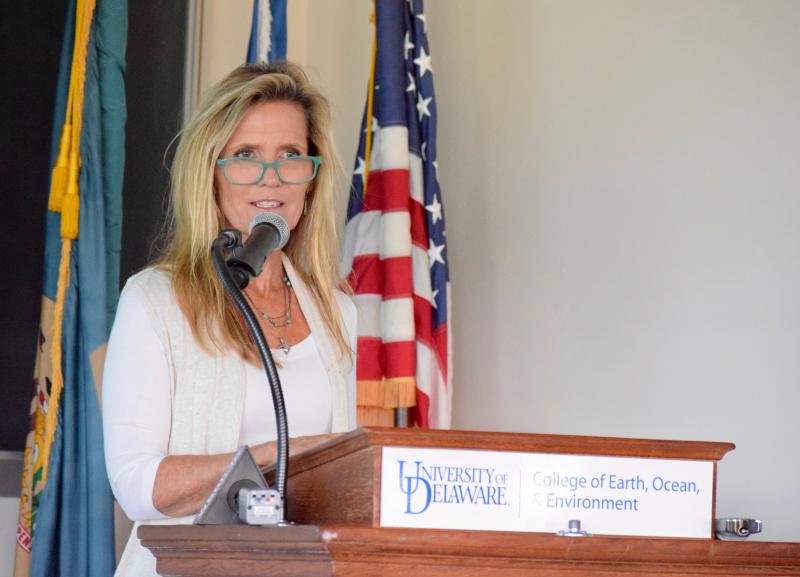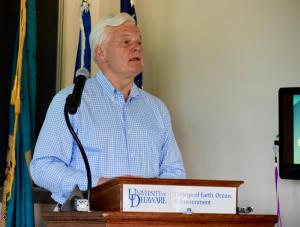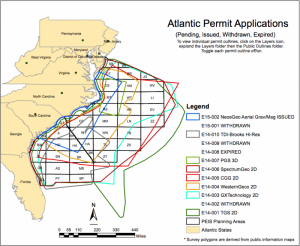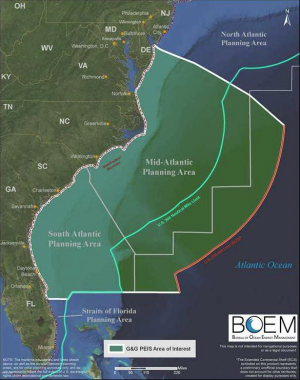Grassroots environmentalists ready to fight offshore drilling
Seismic testing in the Mid-Atlantic is back on the books, and grassroots environmentalists are gearing up for another battle to keep oil and gas drilling far from the Delmarva coast.
“Protecting our coasts from offshore drilling and seismic airgun blasting is something that people from all walks of life can understand and get behind,” said Lewes Mayor Ted Becker. “Most of us along the coast can understand that a healthy ocean transcends our differences and, in fact, helps unite us.”
Becker joined representatives from Surfrider, Oceana, Assateague Coastal Trust and the Marine Education, Research and Rehabilitation Institute to educate about three dozen residents on the next steps for offshore drilling and seismic testing in the Mid-Atlantic during a June 28 community forum in Lewes.
On June 5, the National Marine Fisheries Service announced it will move forward reviewing several previously denied permits that would allow seismic testing in state and federal waters from New Jersey to central Florida.
Seismic testing uses air guns and other equipment to locate potential oil, gas and mineral resources below the ocean floor. Those blasts are described as louder than a jet engine, and the sound can reach miles beyond the source of origin.
Those blasts could affect more than 36 species of marine mammals and sea turtles along Delaware's small coastline, said MERR Executive Director Suzanne Thurman.
“For marine mammals, this could cause permanent hearing loss,” she said. “It causes displacement, where mothers will flee and the young will be separated from them. A calf cannot survive without its mother in the wild.”
When testing is underway, blasts typically occur every 10 seconds, 24 hours per day, seven days a week for months or years until the studies are complete. Scientific studies have shown seismic testing can have both short-term and long-term effects, including trauma or injury to marine animals. The blasts can also scare away fish species, which can impact local recreational and commercial fishing industries.
“This will also affect their prey source, and affect fisheries that impact humans as well,” Thurman said. “The damage that will be done just by the seismic testing alone is irreversible.”
The recent announcement to reopen seismic testing options came five months after former President Barack Obama's administration announced it had denied six pending permits to conduct the testing in the Atlantic Ocean.
Caroline Wood of Oceana said she expects the five pending seismic permits will be granted.
“We know that it's not a good thing for our marine mammals, for our marine ecosystems,” Wood said. “We know that it's something that could potentially hurt tourism, which is a huge economic engine, not just for Sussex County, but for the whole state. And we know, that for the most part, Delaware is unanimous in its opposition to both seismic testing and offshore drilling.”
Prior to the Obama administration's decision to deny seismic testing, the former president also removed the mid- and south-Atlantic planning areas from the Bureau of Ocean Energy Management's 5-year lease program, which spans 2017-22. Before those decisions, more than 100 coastal towns – including Lewes, Dewey Beach, Rehoboth Beach, Milton, Fenwick Island and Bethany Beach – signed resolutions opposing offshore seismic testing, and oil and gas drilling.
On April 28, President Donald Trump issued the Implementing an America-First Offshore Energy Strategy executive order, calling for the Department of Interior to revise the 2017-22 leasing program to consider reopening previously protected ocean areas to oil and gas exploration. That order also rescinded Obama-era protections for deepwater canyons in the Atlantic.
Other Delaware leaders previously have spoken against Trump's order to reopen the Atlantic planning areas to testing and drilling.
“President Trump's order is disappointing, and would reverse important restrictions put in place by the Obama administration,” Gov. John Carney said in an earlier statement. “Delaware does not support any exploration or extraction of fossil fuels from the Atlantic Ocean.”
For more, go to oceana.org or boem.gov/Atlantic-G-and-G-Permitting.






















































